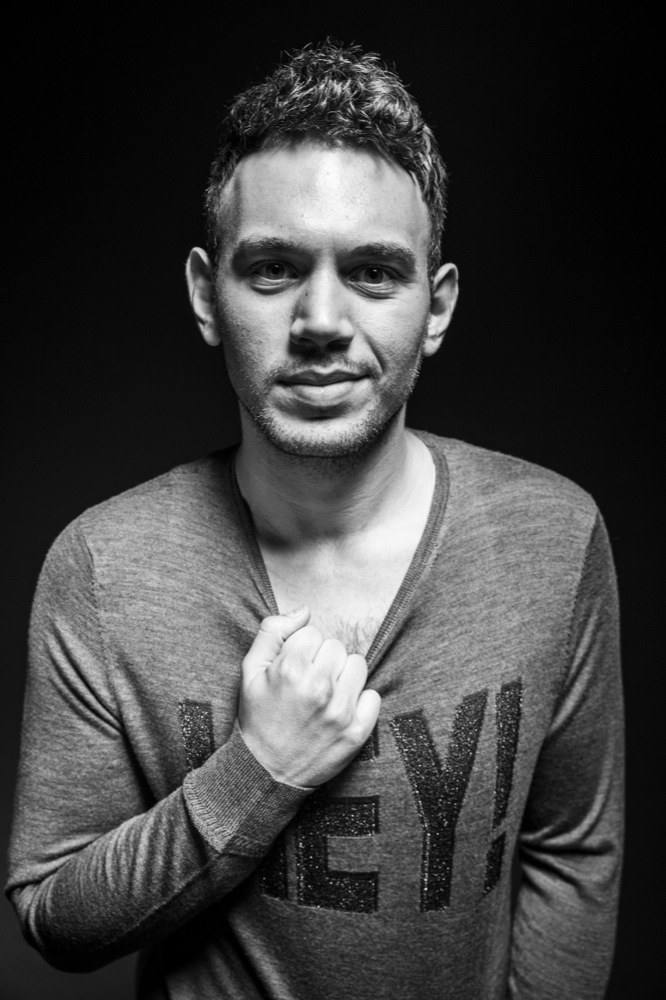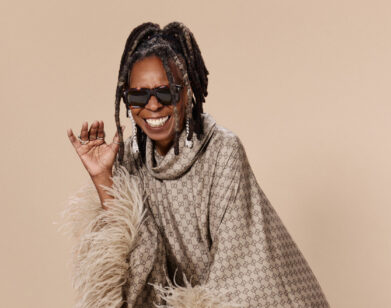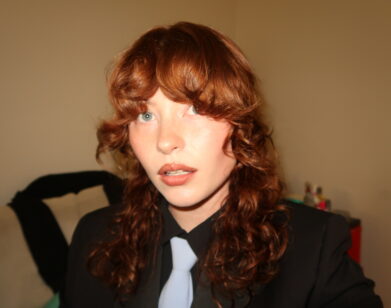Sam Lansky

SAM LANSKY IN NEW YORK, JANUARY 2016. PHOTO BY FRANK SUN.
New York City is America’s pleasure center—and in its increasing singular mode as a bastion of wealth, part of its dream appeal seems to be a new island of the lotus-eaters without any consequence. Perhaps that’s why Sam Lansky’s new memoir The Gilded Razor performs a remarkable two-step: it manages to feel timely and inevitable while, simultaneously, shocking, surprising, and basically blowing the dream factory away.
The Gilded Razor (Gallery Books) opens on a 17-year-old Lansky, a certified child of uptown privilege, preparing for a prospective college visit with his father at Princeton. Needless, to say, Princeton, is not in the cards. What ensues instead are drugs (prescription and non-prescription), sex (a proclivity for random meet-ups with older men), and an obsession with being the glamorous New Yorker a young Lansky idealizes to the point of self-erasure. In one sense, this is the addiction memoir for the next generation (and about once a chapter, I did mentally cry out, “my god, you’re only 17”). But it’s also so much more than that. Lansky brilliantly jumps track on the usual narrative arc of recovery just as his own life jumped a track, or seven.
Part of what makes The Gilded Razor such an engrossing read is how it avoids easy summations and proclamations and comforting moral stances and gets right in that weird, frightening zone where compulsions start to tear down the middle—like desperately wanting something that you no longer even like—and self-destruction becomes a way of continuing on. Lansky is a terrific writer and he smartly keeps his story in a tightened present, one where the road forward extends only as far as his breath. His style is malleable enough to send us on a wilderness program for delinquent teens through the outback of Utah and on an extreme spiral through men and crystal meth in Boston.
Lansky survived. He’s now a cultural editor at Time, and was in New York for the release of the book. We met up for lunch in SoHo.
CHRISTOPHER BOLLEN: You recently moved to L.A. Do you like it?
SAM LANSKY: I love it. I am so much happier there. I feel so lucky that I got to move.
BOLLEN: Maybe it’s partially because you came of age in New York—and obviously so much happened to you here.
LANSKY: I think New York felt like a captor to me. I felt like I was New York’s hostage. It was an abusive relationship. [laughs] It just kind of kicked my ass on the regular.
BOLLEN: While reading your memoir, maybe because you were so young, I kept blaming your spiral on New York. But the problems started in Portland, long before you moved east. Do you think New York accelerated your addictions to the nth degree?
LANSKY: I think I was going to be the kind of drug addict I was going to be regardless of where I was. It took a different shape because of New York. And certain things were amplified. So much of moving here at this pivotal point in my development as a teenager was about fulfilling this vision I had of myself for my life that was much more glamorous than the reality of my life in Portland.
BOLLEN: Which is the same impetus that brings all of us to New York. We want the glamorous life of the imagination.
LANSKY: Right. A lot of people do move here when they’re young adults but they have a more solid footing on their identity and they can make better decisions. Because I moved at this age where I think I was still really figuring out who I was, and I was not mature or sophisticated enough to like make good choices for myself and didn’t have a lot of guidance helping me to make those choices, in a way I actually got to live the fantasy I had of myself living in New York—and then it kind of took me down.
BOLLEN: You’re right. I moved to New York at 20 and it was filled with temptations. But I kept reminding myself that you were 17 years old when all of this was happening. And some of the things that happened to me at 30 were nowhere near as extreme as what you were undergoing as a high school student.
LANSKY: Yeah, I know. I feel like I lived a very dense, textured gay twenties crammed into three really intense, amphetamine-fueled years. It’s been really funny as I’ve gotten older because my friends have caught up to where I was when I was in high school. They’re starting to have those experiences that are really formative for them that I had a long time ago. I’m not saying I was mature or ahead of the curve. I was a mess, obviously. I should not have been doing those things in high school. But for better or for worse I was. Then getting sober at such a young age… it’s been interesting to hear my friends have these experiences that feel really distant to me at this point having been sober for almost eight years.
BOLLEN: How soon after your getting sober did you realize you might want to write a book about it?
LANSKY: I think I knew I was going to write this book by the time I came out of the daze of being in active addiction and got a little bit of clarity. It just felt like there was a book there.
BOLLEN: Were there any memoirs that you particularly admired?
LANSKY: Running with Scissors I loved so much. I also love Ed White’s A Boy’s Own Story, Tobias Wolff’s This Boy’s Life, Frank Conroy’s Stop-Time. From the addiction memoir space there is Lit by Mary Karr. Drinking: A Love Story is maybe the best book about addiction out there. And Bill Clegg’s book, A Portrait of an Addict by a Young Man, is fantastic. I know I had experiences in my life that a lot of people would find shocking, but some of my favorite memoirs are books in which basically nothing happens. I knew what I was working with was something fairly sudsy.
BOLLEN: You didn’t feel overwhelmed by the genre of the recovery memoir or the addiction memoir? Sometimes all of the influences can be a bit disabling when it comes to doing your own.
LANSKY: Well, I hope I don’t sound lofty talking about it, but I didn’t set out to write a memoir per se. I wanted to write a coming of age story. But a coming of age story with unique specific details—to say the least. A lot of drugs. A lot of sex. And a lot of very, very bad behavior. Have you ever read Vivian Gornick’s The Situation and the Story? It’s the best book about writing personal narratives out there. She differentiates between the situation and the story. The situation is the synopsis of the plot—what is actually happening. But the story is the emotional current or tide, what is underneath the words. So the situation is obviously the kid does a lot of drugs and fucks a lot of older dudes. That was unambiguous. That was my life. There was really no getting around that. But the story was a little more malleable. It’s taking place when I am so young and it’s documenting my first experiences with physical intimacy and figuring out who I was and what mattered to me and the person that I am trying to become. That’s the material that I was grappling with. So, yes, it felt like it was more a coming of age story than it was an addiction memoir or a recovering memoir. Of course not everybody sees it that way. The early press I’ve gotten seems more about the drugs and the sex.
BOLLEN: Well, I mean… you can’t really blame them.
LANSKY: Which is understandable because it’s front and center. But I really hope that people who read it take something away more than its most sensational elements. Obviously, they can take away from it whatever they want. A friend who is a recording artist told me, as soon as you turn this in, it is no longer yours. It belongs to the people who develop a relationship with it. Your work is over. You did your thing. And I thought that was really smart. I’ve been trying to keep that in mind.
BOLLEN: How long did it take you to write it?
LANSKY: It was about three years writing in earnest. I think. Pieces of it I wrote when I was in college. Pieces of it I’d work-shopped before. It was definitely stitched together in some respects. There are lines or descriptions that I wrote when I was 17 about when I was 13. The material about my first boyfriend, that was something that I remember work-shopping in my senior year English class.
BOLLEN: Did you know the exact arc of it? Where it would start and where it would stop?
LANSKY: I did, yeah. This funny thing happens when you get sober and stay that way, which is that it creates this really, really clear distinction of before time and after time.
BOLLEN: Like B.C./A.D.? Before and after getting sober?
LANSKY: Exactly. When I think about my life and my past, May 2, 2008 is this defining date where my life as I experience it now began.
BOLLEN: It’s some rare to be able to pinpoint transformation down to the exact day.
LANSKY: Totally. But it’s a powerful marker for me. I knew when I was writing that I didn’t want to go very far past that date. I wanted to keep it focused on the before time—everything that happened before May 2, 2008. Being sober is so embedded into my life but I wouldn’t say so much that recovery is. I’m not super involved in 12-step programs or…
BOLLEN: So you aren’t going daily to A.A. meetings?
LANSKY: I used to be much more plugged into 12-step recovery. I still think of it as sort of the bedrock of my experience, but it’s not something that is a daily part of my life.
BOLLEN: A few of my friends got sober really young like you did and I was interested that a few of them eventually started drinking again—they felt they could handle it as an adult in a way they couldn’t as a child.
LANSKY: I have a few friends who I went to treatment with when I was young who are now moderate drinkers.
BOLLEN: Are they in control?
LANSKY: There’s a saying in 12-step programs that once you’re a pickle you can never be a cucumber again. And I feel thoroughly pickled. I feel confident enough in how pickled I am that it is not worth the risk.
BOLLEN: Is the temptation so abstract it’s hardly there?
LANSKY: I dream about it a lot still. Even after eight years, it’s definitely at play in my subconscious just because my experiences with drugs and alcohol were so incredibly powerful and formative that it continues to bubble around in there even after almost a decade. But I am never at a bar and have a craving to get drunk. My life is so binary in terms of what happened then and now. They are two very distinct periods that I just wanted to be in the former in the book.
BOLLEN: Most recovery memoirs are, at their core, redemption stories. They follow the structure of Saint Augustine’s Confessions. There is the narrative light at the end of the tunnel.
LANSKY: Did you think my book was redemptive?
BOLLEN: I think you handled it smartly. It doesn’t feel dogmatic or preachy. There isn’t the specter of the lesson hovering around the end.
LANSKY: I always find it really disingenuous. There may be people out there whose lives are about embracing the challenges of sobriety in this super Zen way but that’s not my journey. I am really, really grateful to be sober and I wouldn’t give it up for anything in the world. But it’s hard in a lot of ways and it’s complicated and it’s still complicated. And that was really important for me to put into the book. One of my biggest pet peeves is when people say things like, I don’t regret anything because it brought me to where I am now. You hear that a lot in 12-step programs. Well, I regret hurting people I loved. If I could change history and not have inflicted great harm on loved ones that would be dope. So it was important for me to end on a more ambiguous note.
BOLLEN: One of the things I admired about the book was that I often had no idea where it was going. My idea of the narrative arc kept changing. Like when you went on the wilderness program I figured that was going to lead you to sobriety. But the book kept veering off in ways that I wasn’t expecting.
LANSKY: Good, I’m glad. My life kept veering off in ways that I didn’t expect. I loved writing the Aspen/wilderness material so much.
BOLLEN: Do you still have that tool you used to learn to build fires?
LANSKY: I do. Actually one of my best girlfriends was over at my place in New York right before I moved and she had just read the book and we were talking about the Aspen stuff. While she was sitting on the couch I went into the other room and under my bed and removed the anklebone and showed it to her. And she just burst into tears. She wasn’t expecting me to retrieve that and thought it was super fucking cool. Which is it. It’s a great artifact.
BOLLEN: With this B.C./A.D. change, have friends you’ve only known in A.D. been shocked or surprised by your former life?
LANSKY: When people find out that you’re sober, it’s kind of like telling them that you’re gluten free or something. Unless they have a context they might say like “congratulations” or whatever. But if their impression of you is that you’re fine they don’t really think about what it means. But when they know your story intimately and know the shit you’ve been through, it’s really shocking. My best friend here who I lived with for two years and had a really, really intimate friendship with… there was stuff in the book that he didn’t know. Like I don’t go around advertising like the breakdown in Boston, for example. That’s just not shit that I talk about ever. So I think it’s solicited a lot of surprise from friends and colleagues. If you meet me in a professional capacity I don’t think I necessarily register as somebody who’s life was at any point that interesting. [laughs] So it’s definitely elicited some surprise.
BOLLEN: The Boston section is the last section—and it’s brutal what you go through. It’s really beautifully written as well.
LANSKY: I wrote it as its own piece. I was 21 when I wrote that. And I wrote it in one sitting in about five hours and didn’t touch it. I don’t know what was happening that evening that made that so accessible to me that I bled onto the page. I wrote it in kind of a fever state. Which is not how I wrote most of the book.
BOLLEN: I was reading the Kirkus review of your book, which is a good review, but they say this nonsensical thing at the end about how it might be too personal.
LANSKY: Has anyone ever said that about a memoir before?
BOLLEN: I know. Isn’t it supposed to be?
LANSKY: Right. Can it be less personal?
BOLLEN: But was there anything that was too personal to include? Was there anything you couldn’t write about?
LANSKY: No! Nothing! I approached it with black and white adolescent morality—I have to put everything in there. If I hold anything back it’s not honest. That was the intention that I had and that was how I executed it. Now I do wonder if I had held back 10 percent of the most grizzly shit, maybe it wouldn’t have been a worse book for it and I would have spared myself a lot of potential embarrassment and humiliation and looking at people and wondering if they were thinking about that fucked up thing I did.
BOLLEN: But it wouldn’t have been as good of a read. I kept doing this weird thing where I was judging the level of the hole you were digging for yourself. And, at first I was like, it’s not that bad. He isn’t in that deep. And then it just kept getting deeper and deeper until…you were in Boston. To cut corners might not give the impression that you were really close to death at the very end.
LANSKY: True. It’s been funny to see what people react really, really strongly to. Because it’s all sort assigned equal weight in my B.C. memory. It’s all just the same shit. Some of it was darker than other stuff.
BOLLEN: Do you think you came to any conclusion as to why you were so susceptible to addiction? Not to turn the story into a lesson, but what do you think the root of the addiction is?
LANSKY: From the second I started putting substances into my body I felt better than I had ever felt before and I wanted to feel that way all the time. I think there was a really strong biological component to it that runs in my family. I feel pretty strongly that I was born that way. From my first sip of alcohol to my last shot, it was like, “I want to feel this way all the time. Being sober is unbearable.” Addicts are people who feel things really deeply. I remember feeling that my skin was so thin. Everything was just really intense for me all the time, dude. Everything was so intense. I had to anesthetize that. I had to medicate it. And that’s how I felt up until the bitter end. Even as my life was falling down around me I just felt like this was medicine. This was what I needed.
BOLLEN: Sometimes the worst drugs aren’t those that almost kill you. Some drugs require you to decide between quitting or dying. But other drugs just slowly deplete and erase a person without really killing them, and those can be the most dangerous.
LANSKY: The delineation between drugs is so frequently classist and racist and not actually aligned with the experience of taking those drugs. Adderall is like a white-collar vitamin. Cocaine is a party drug for rich and beautiful people. Meth is this white trash scourge. They all look the exact same way in the brain. If you look at neurological scans of people on those drugs they’re identical. They work on the same neurotransmitters. They vary in potency depending on what you were doing and how pure it is, but it’s the same shit. And yet identifying that you had a cocaine problem, it’s like, “Join the club.” You live in New York. If you tell people that you used to do meth, they freak out. It’s all so politicized in this way that had nothing to do with what those drugs actually are like which I think is fascinating.
BOLLEN: Finally, I was interested in how homosexuality was handled in the memoir. Specfically, that you came out so young and it was really no big deal for your family. You were unconditionally accepted. And that worked against a more traditional idea of how addiction and homosexuality both involve the double life, or the hidden life, the kept secret. I always thought that might have been why gay men were more susceptible to addiction. But you didn’t have to live that secret life.
LANSKY: I am a member of the first generation of gay men who get to tell stories that are not really about homophobia or the AIDS epidemic. It’s a very, very different experience to come out now. Which is amazing, obviously. It wasn’t something that I felt ashamed about and it wasn’t something that I had to wrestle with in this arduous way. Which I think would have been the experience had I been born five years or 10 years earlier. It’s been such a rapid shift. So I think that part of what is going to start to happen—and I hope that I am part of this—is that we’ll get stories from gay people that are about what it’s like to be young and gay without either of those older narratives underlining the whole story. I really look forward to that. For me, being gay is a huge part of my story and I think the way gay men approach intimacy, which is different in a lot of ways than the way straight people approach intimacy, was something I struggled with. I don’t think that I did more drugs necessarily because I was gay but I definitely know that even though coming out wasn’t hard there was kind of a big “now what” after it happened and that’s the space I wanted to write into. What does this mean for my intimate relationships? It’s not a painful self-admission, but even the complicated nature of my relationship with older men of all stripes as depicted in the book. Gay men just have different relationships with their dads then straight people do. That’s undeniable. I know I did. And our sexual relationships are different. Our romantic relationships are different. There is so much interesting stuff there that hasn’t been explored yet because we’ve had so many battles to fight.
BOLLEN: It really is a shift. In previous generations you couldn’t come out until you were out of your home. Because then you were no longer in danger of getting kicked out.
LANSKY: I am really eager to see what kinds of stories people from my generation tell. I could be wrong but in 2006 when most of this book is taking place, I can’t have been the only gay teenager who was meeting dudes on the Internet.
THE GILDED RAZOR IS OUT NOW FROM GALLERY BOOKS.






